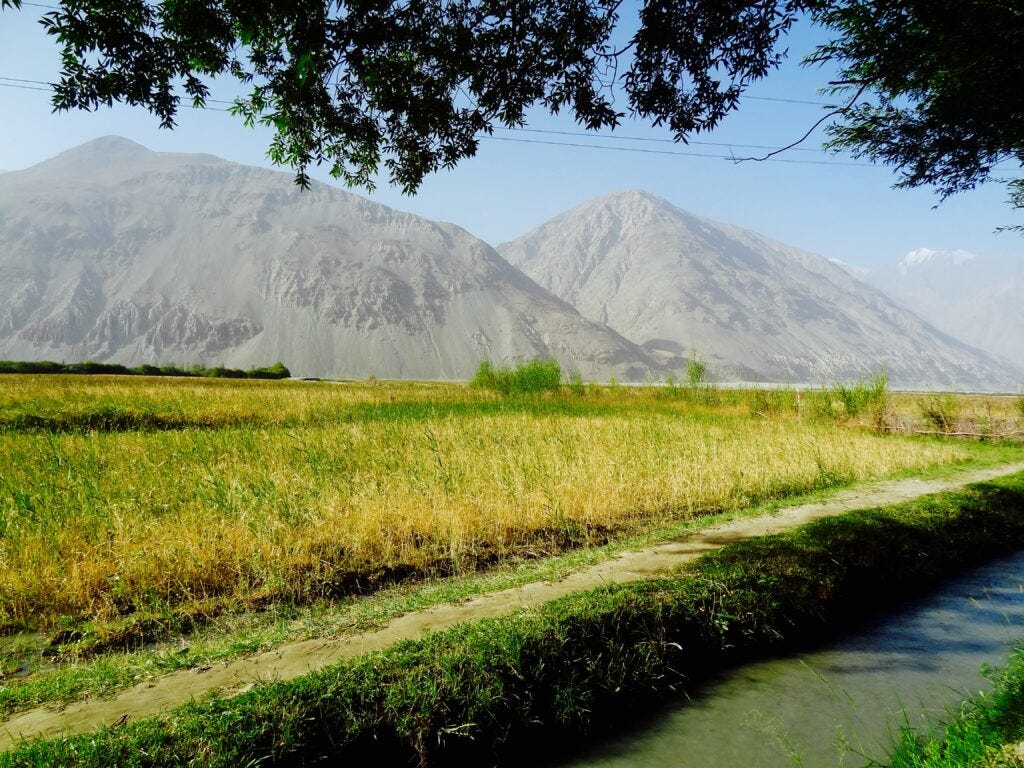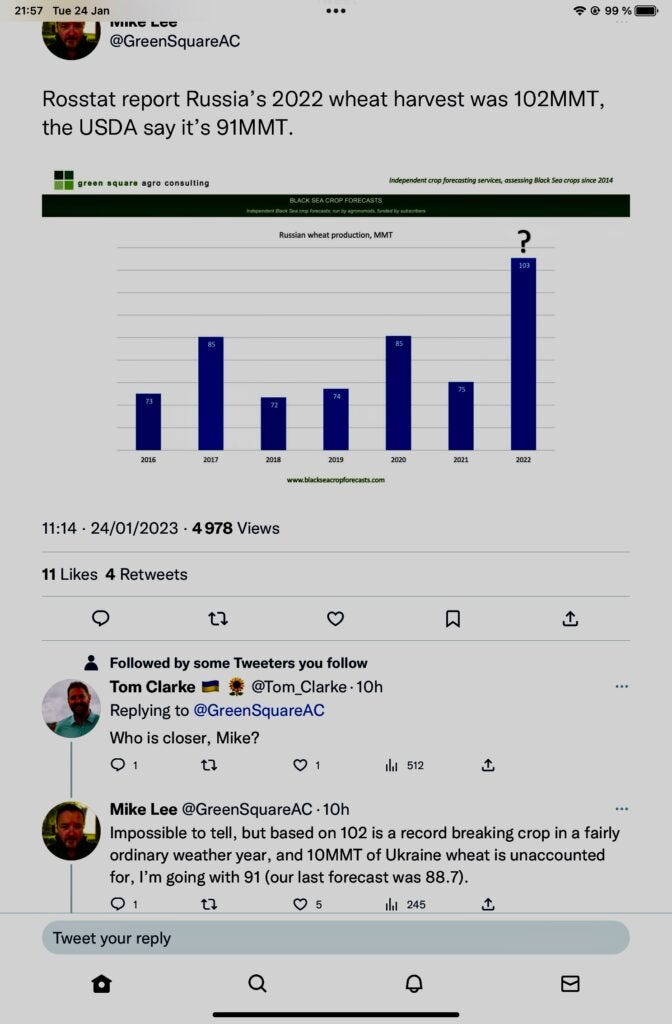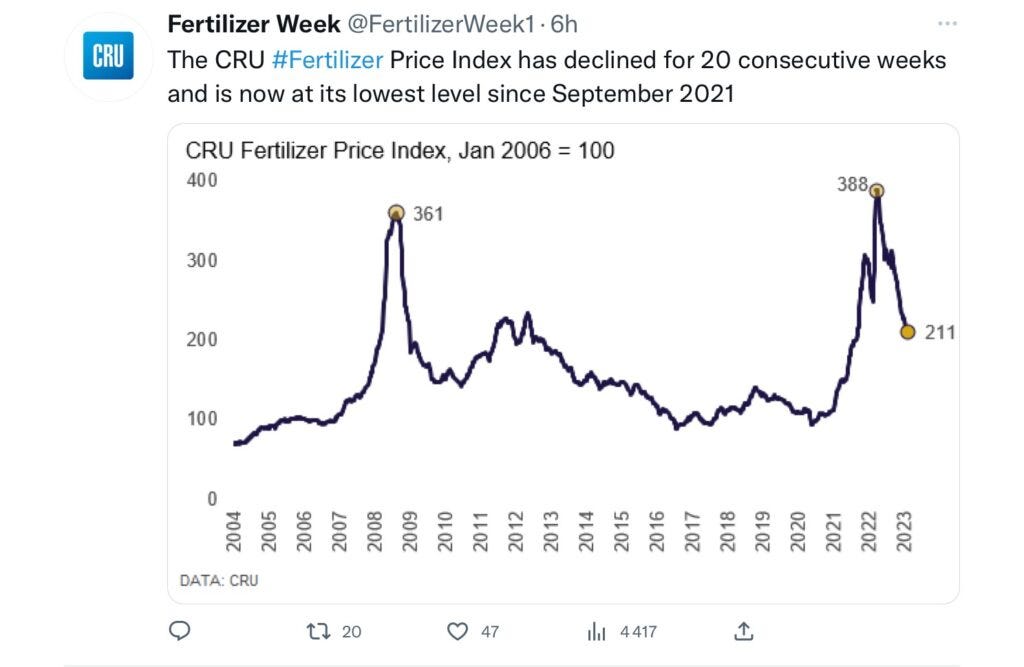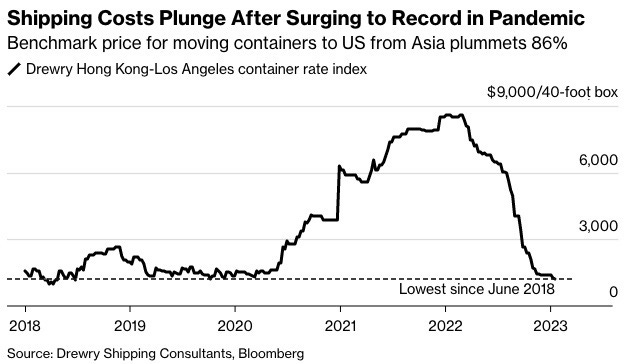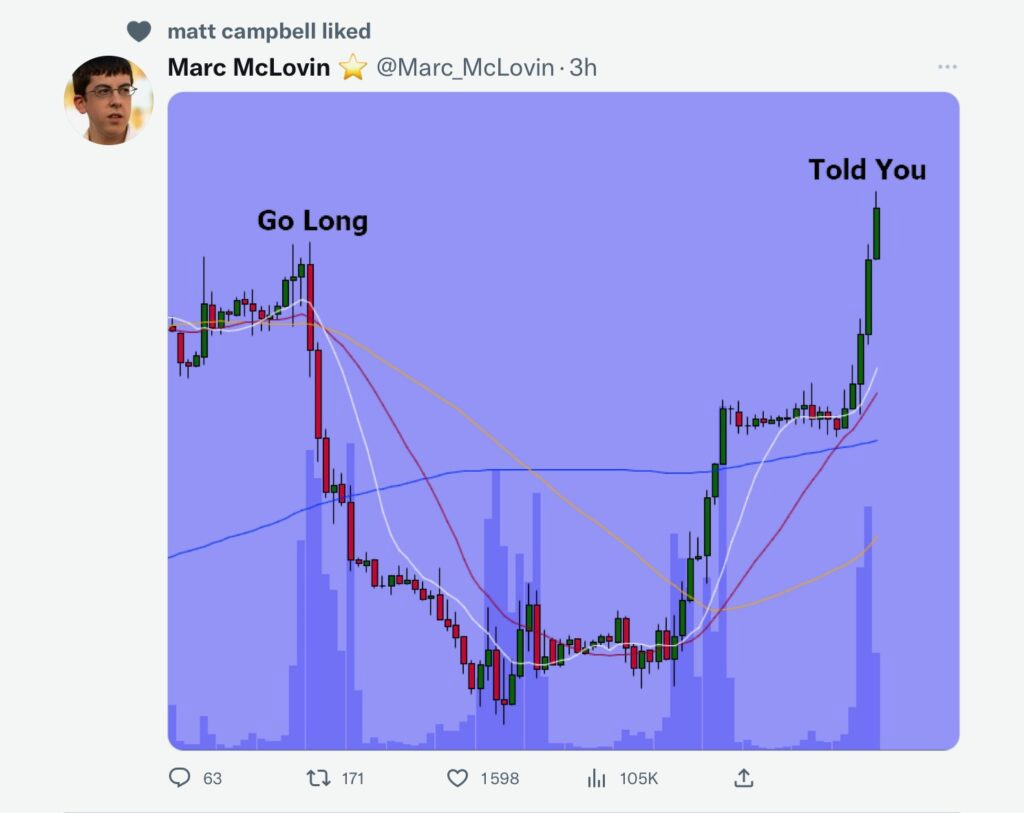Ag-Trader News
Markets
Brazil’s 2022/2023 summer grain production will exceed the country’s total storage capacity for the first time in 20 years. Farmers will harvest 189.5 million mt of soybeans, corn, and rice in the summer, but the storage capacity is 187.9 million mt. A good winter corn harvest may exacerbate the situation.
NASA calculates that Ukrainian farmers harvested 26.6 million mt of wheat in 2022, down from the previous year’s record harvest of 33 million mt but close to the five-year average of 27.9 million mt. Unfortunately, Ukraine cannot access 22 per cent of that wheat in the eastern part of the country due to the war.
The Ukrainian Grain Association (UGA) expects Ukraine’s grain and oilseed production to drop to 53 million mt in 2023, down from around 65 million mt in 2022 and 106 million mt in 2021. The UGA president said it is no longer profitable for farmers to produce grain.
As of 23rd January, Ukraine had exported 25.45 mln mt of grains and pulses, down 30 per cent on the previous season. Wheat exports amounted to 9.2 mln mt, down 45 per cent on last season. Corn exports amounted to 14.4 mln mt, up 3 per cent on last season.
Inspections of Ukrainian grain ships have slowed to half their peak rate, creating backlogs. Some US and Ukrainian officials accuse Russia of deliberately slowing down checks, which a Russian official denied.
The USDA said Russia's official wheat production estimate of 104.43 million is "not feasible". The USDA estimates Russia's 2022 wheat harvest at 91 million tonnes.
The Indian government will provide three million mt of wheat to bulk consumers, such as flour millers, to cool record-high domestic prices.
Sugar mills in India’s western state of Maharashtra may close early due to poor weather, threatening export volumes, while a plague of rats is decimating sugar cane in Northern Queensland.
The Environment
Germany is considering phasing out biofuels produced from food or animal feed crops by 2030 by progressively reducing the maximum level of biofuel blending. About half of Germany’s total winter rapeseed area of 1.07 million hectares currently goes to biodiesel production.
In a blow to the European sugar beet industry, the Court of Justice of the European Union has ruled that member states can no longer offer exemptions to the bloc’s ban on crop seeds treated with neonicotinoids.
The UK government has ignored the ruling and authorized neonicotinoid pesticide treatments on this year’s sugar beet crop. It explains why here.
The UK government has (at last - phew!) published its plans to support farming post-Brexit. The government will base funding on environmental protection, such as conserving hedgerows and maintaining peatlands. The new incentives, called environmental land management schemes (ELMs), are worth £2.4bn a year for this parliament.
The FT argues that the new rules pose a significant risk to farm finances. The newspaper writes, “So-called “direct payments” from the EU based on land area made up 60 per cent of farm net income before Brexit. At a typical livestock farm, they accounted for the entirety of profits. Now they have been slashed by at least 35 per cent, with more cuts to follow.”
Louis Dreyfus Co. (LDC) has launched the Climate Resilience Prize, a new 100,000 Swiss franc award that supports start-ups working to drive climate resilience in agriculture and food value chains.
A new study questions the environmental benefits of rainforest carbon offsets, arguing that 90 per cent of them are worthless. The study could, however, be flawed and based on wrong assumptions.
Climate change will likely have a negative impact on coffee production, but the BBC explains how you can be a more environmentally friendly coffee drinker. (Spoiler: it involves capsules and pods.)
The FAO wants you to be a food hero to reduce waste.
Fertilisers
Rising prices led to a 70 per cent surge in Russia’s fertilizer export revenue. Despite expectations to the contrary, export volumes fell by only ten per cent. Retail fertilizer prices have now fallen to their lowest in 15 months.
BP Bunge announced that they will phase out the use of mineral fertilizers on their sugarcane fields by 2025.
The FT has interviewed the CEO of Yara (the world’s biggest fertilizer manufacturer) on the company’s decarbonization plans.
Researchers continue their quest for alternative fertilizers, including human waste, although Wired Magazine believes that the world is hooked on phosphorous.
Animal protein
Reuters writes that lab-grown meat could become a reality in some US high-end restaurants as early as this year. Due to its cost, it could be a while before it hits supermarket shelves.
Bloomberg argues that alt-meat is just another food fad. The news agency is more optimistic about cow-free dairy products. The FT agrees.
Unsurprisingly, the privately held Impossible Foods disagrees with Bloomberg’s view on alt-meat, arguing that their alt-meat sales continue to grow. Some believe, however, that plant-based meat’s error may be the exact thing that was supposed to make it popular: its attempt to be indistinguishable from meat.
Investment is still coming into the sector with the launch of a new $300 million Smart Protein Fund to “back alternative proteins and decarbonize the food industry.”
A professor at Stamford University believes that even if alt-meat proves popular, we should instead concentrate on reducing GHG emissions from real meat (and dairy) production. Bill Gates agrees.
Could the dairy farm floating in Rotterdam harbour herald the future of livestock production?
In the meantime, we may already have reached peak real meat consumption.
Shipping
The Baltic Exchange’s main sea freight index has fallen to its lowest level in two years, dragged down by a dip in Capesize and Panamax rates. Falling shipping costs could be good news for inflation in the future.
MSC and Maersk – the numbers one and two in the global container shipping industry - agreed to end their 2M vessel-sharing alliance effective January 2025.
Maersk, one of the most prominent investors in methanol-fuelled ships, has invested in C1 Green Chemicals to mass-produce green methanol at a competitive price.
Neoline Armateur has launched the long-awaited construction of its first sail-powered cargo vessel. The ship will offer a capacity of up to 5,300 mt of cargo. Click here for more on sail-powered vessels and to watch a cargo ship kite surfing.
Company news
ADM estimates a record fourth-quarter profit in 2022 and predicts another very strong year in 2023. (Click here for an upbeat take on the ADM call.)
CHS and Cargill will expand the export capabilities of their joint venture, TEMCO LLC, with the addition of Cargill’s export grain terminal in Houston, Texas. TEMCO currently operates three facilities in the Pacific Northwest.
The Globe and Mail have a long read on Sucro Can, the new competitor in Canada’s sugar market.
Finally, here is a price graph that will resonate with ag-traders worldwide.
Many of the above links require subscriptions. Please support quality journalism.
© Commodity Conversations ® 2023

